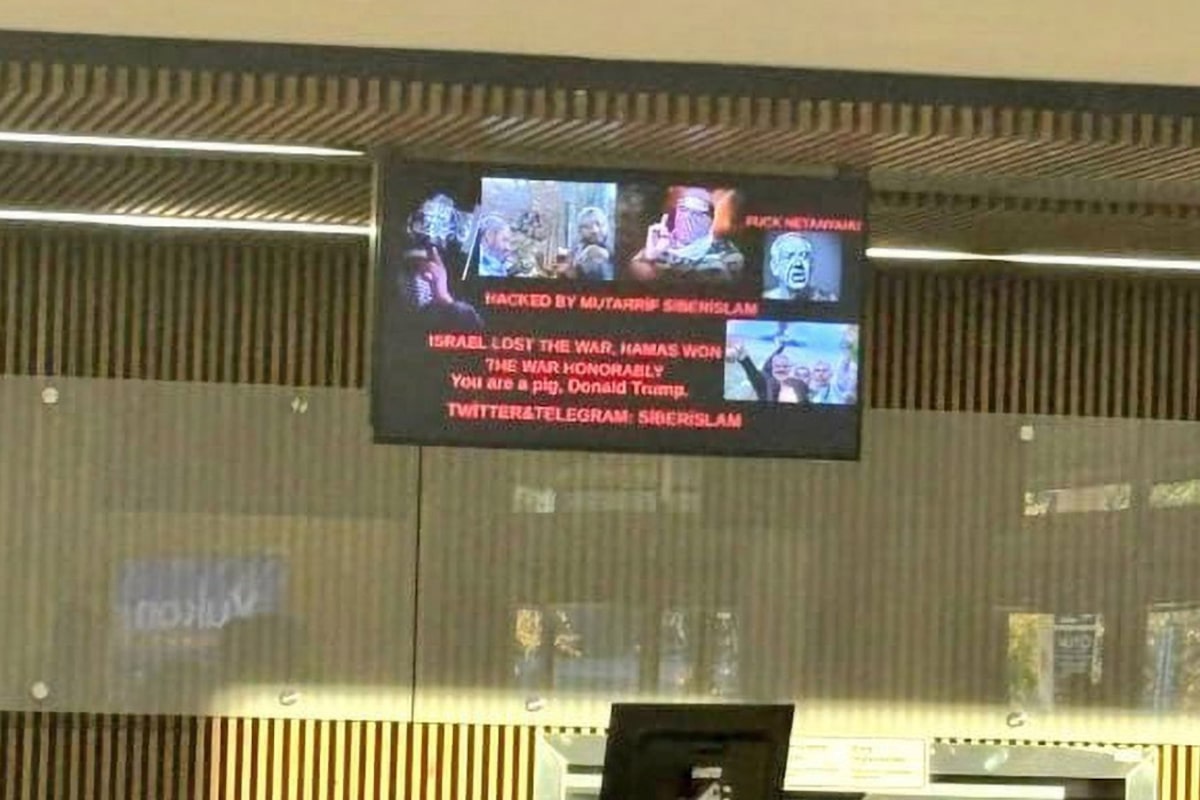A pro-Hamas message displayed on one of several screens at Canadian airports after their system was hacked. The incident caused several flight delays in Kelowna, Victoria and other airports. SUPPLIED/TWITTER
The flight-information screens and public-address systems at three Canadian and two U.S. airports were briefly hacked to broadcast a pro-Hamas message that heaped scorn upon Israel, Prime Minister Benjamin Netanyahu and U.S. President Donald Trump.
Airports in Windsor, Ont., and in the B.C. cities of Kelowna and Victoria all grappled with the cyberattack Tuesday, according to Transport Canada. The federal regulator said Wednesday that it is working with police to ensure there was no impact to the safety and security of these facilities and to prevent similar incidents from reoccurring.
The agency referred questions about any investigations into the cybersecurity breach to the local police in these three cities.
Victoria police and the Kelowna RCMP detachment did not comment on the incidents Wednesday afternoon. Windsor police told The Globe and Mail to contact the Mounties for comment, but the federal RCMP did not immediately respond Wednesday evening.
Last week, a ceasefire agreement brokered by Mr. Trump was reached between Israel and Hamas. Twenty living hostages held in Gaza have now been returned to Israel, while hundreds of Palestinian prisoners were released by Mr. Netanyahu’s government as part of the deal.
Israelis return to Oct. 7 sites, but some don’t see long-lasting peace
Sam Samaddar, chief executive officer at Kelowna International Airport, said the hack exploited the third-party cloud software used on these screens and announcement systems. He confirmed that this was the same vulnerability that disrupted the other two Canadian airports as well as one in Oregon and Pennsylvania.
Mr. Samaddar said two domestic flights were significantly delayed but it took just a few minutes for the system to be shut down by the Kelowna airport’s IT expert, who was still on shift at the time of the attack around 5:15 p.m., local time.
“We deemed the threat to be non-specific – it was not really targeting aviation – and so we had a very high comfort level in terms of our operations not being jeopardized,” he said.
Victoria airport issued a statement confirming that their staff were able to shut down the cloud-based system shortly after the messages began broadcasting. Officials at Windsor International Airport had no comment about the incident.
Mr. Samaddar confirmed images on social media showing the main text on screens was: “Israel lost the war, Hamas won the war honorably. You are a pig, Donald Trump.”
Separate doctored images of militants as well as Mr. Netanyahu were photoshopped crudely around the bright red text.
The hacked message credited a user on social media. That account spent Wednesday celebrating media coverage of the airport incidents.
Experts have long criticized Canada and its public institutions as a high-value, low-risk target for cybercriminals.
After release from Israeli prison, a Palestinian reflects on what it means to be free
The 2025-26 forecast from the Canadian Centre for Cyber Security said that state-sponsored cyberthreat actors are very likely targeting critical-infrastructure networks in Canada and allied countries to prepare for possible future disruptive or destructive online attacks.
The centre said China’s expansive and aggressive program presents the most sophisticated and active state cyberthreat to Canada today.
David Shipley, chief executive of Beauceron Security, a New Brunswick software and training company with clients around North America, said Tuesday’s hack appears to be a stunt not a serious attack, noting that there has been no mention of ransom demands from those behind the breach.
He also pointed to the account mentioned on airport screens, continuously promoting news stories about the hack, as more proof that the responsible person or group is unsophisticated.
“When you’re victorious, you generally don’t need to self-promote,” he said. “It’s like it’s the cyber equivalent of someone running around saying ‘I’m cool’ – the moment that you say you’re cool, you probably aren’t.”
Still, he said, the incident – which he likened to cyber graffiti – underscores how smaller local police departments or RCMP detachments are ill-suited to confront the threat of hackers operating from across the globe.
“I couldn’t be more blunt: How is it [okay] in any way, shape or form for a 21st-century country to expect these tiny police forces to have any resources to help the airports in this case?” he said. “It’s beyond ludicrous and it just highlights we’re not a serious country.”
With a report from The Canadian Press
